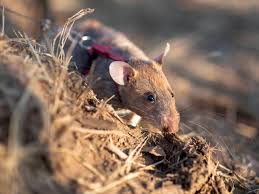A giant African pouched rat named Ronin has set a new world record by detecting 109 landmines and 15 pieces of unexploded ordnance (UXO) in Cambodia, according to Belgian charity APOPO. Since his deployment to the northern Preah Vihear province in August 2021, Ronin has become the most successful Mine Detection Rat (MDR) in the organization’s history. The five-year-old rodent’s achievements have earned him a Guinness World Records title, surpassing the previous record held by Magawa, another “hero rat” who detected 71 landmines during his career.
APOPO, a nonprofit specializing in humanitarian demining, trains African giant pouched rats to sniff out explosives. These rats are light enough not to trigger landmines and use their acute sense of smell to identify chemical compounds in explosives. Ronin’s handler, Phanny, described him as more than just an asset, calling him a “valued partner and colleague.” Despite his record-breaking success, Ronin is expected to continue detection work for at least two more years.
Cambodia remains one of the most heavily mined countries globally due to decades of conflict. Since 1979, landmines and UXOs have caused approximately 20,000 deaths and injured twice that number. Efforts to clear these remnants of war have been ongoing, but challenges persist. In February 2025, a rocket-propelled grenade explosion killed two toddlers in Siem Reap province, underscoring the urgency of demining efforts.
Ronin’s predecessor, Magawa, was celebrated for his contributions to demining and was awarded the UK’s PDSA Gold Medal for animal bravery in 2020. Magawa cleared over 225,000 square meters of land during his five-year career before retiring in 2021 and passing away in 2022.
Cambodia initially aimed to be mine-free by 2025 but has extended the deadline by five years due to funding challenges and newly discovered minefields along the Thai border. Ronin’s remarkable achievements highlight the critical role of trained animals like HeroRats in advancing humanitarian demining efforts and saving lives.
